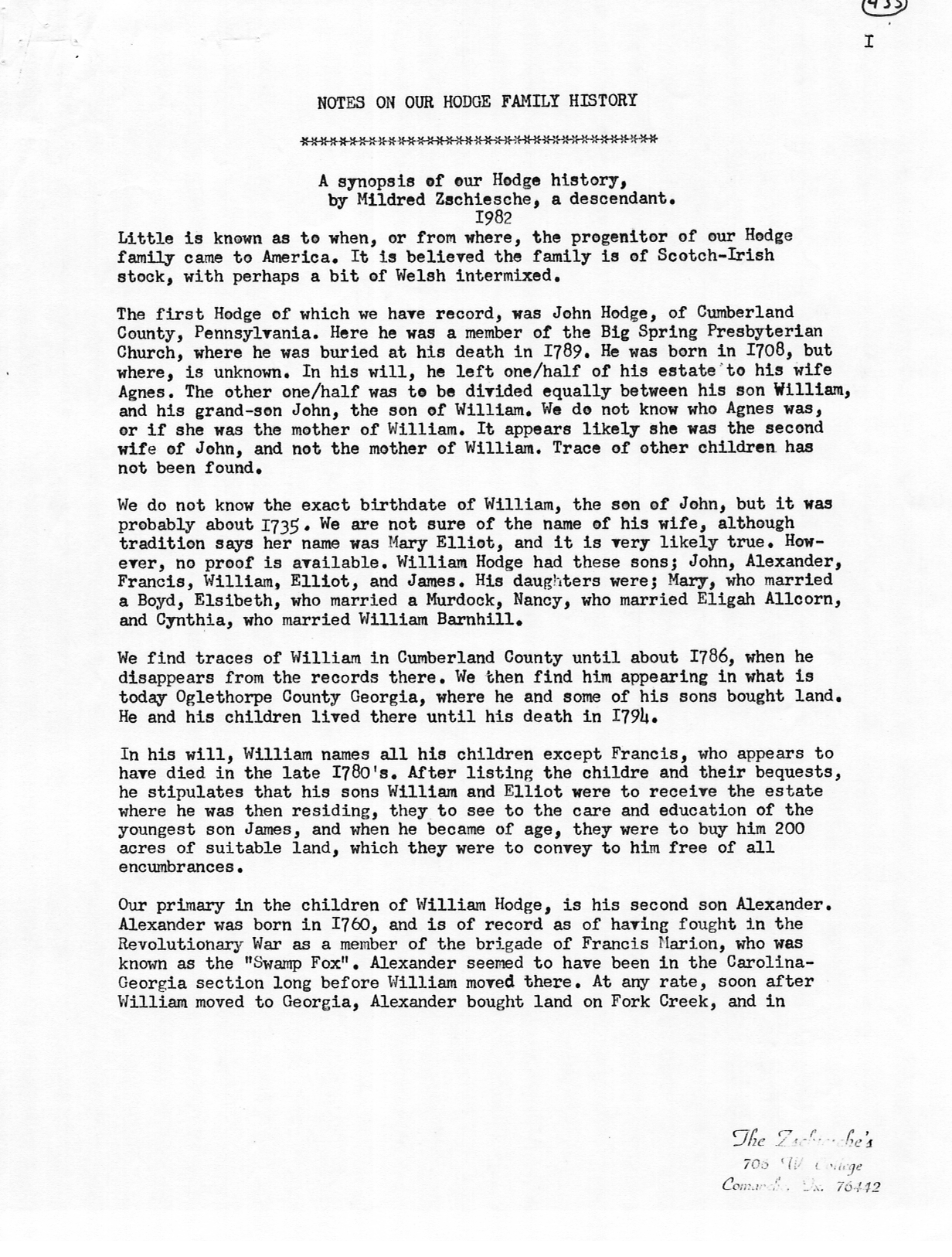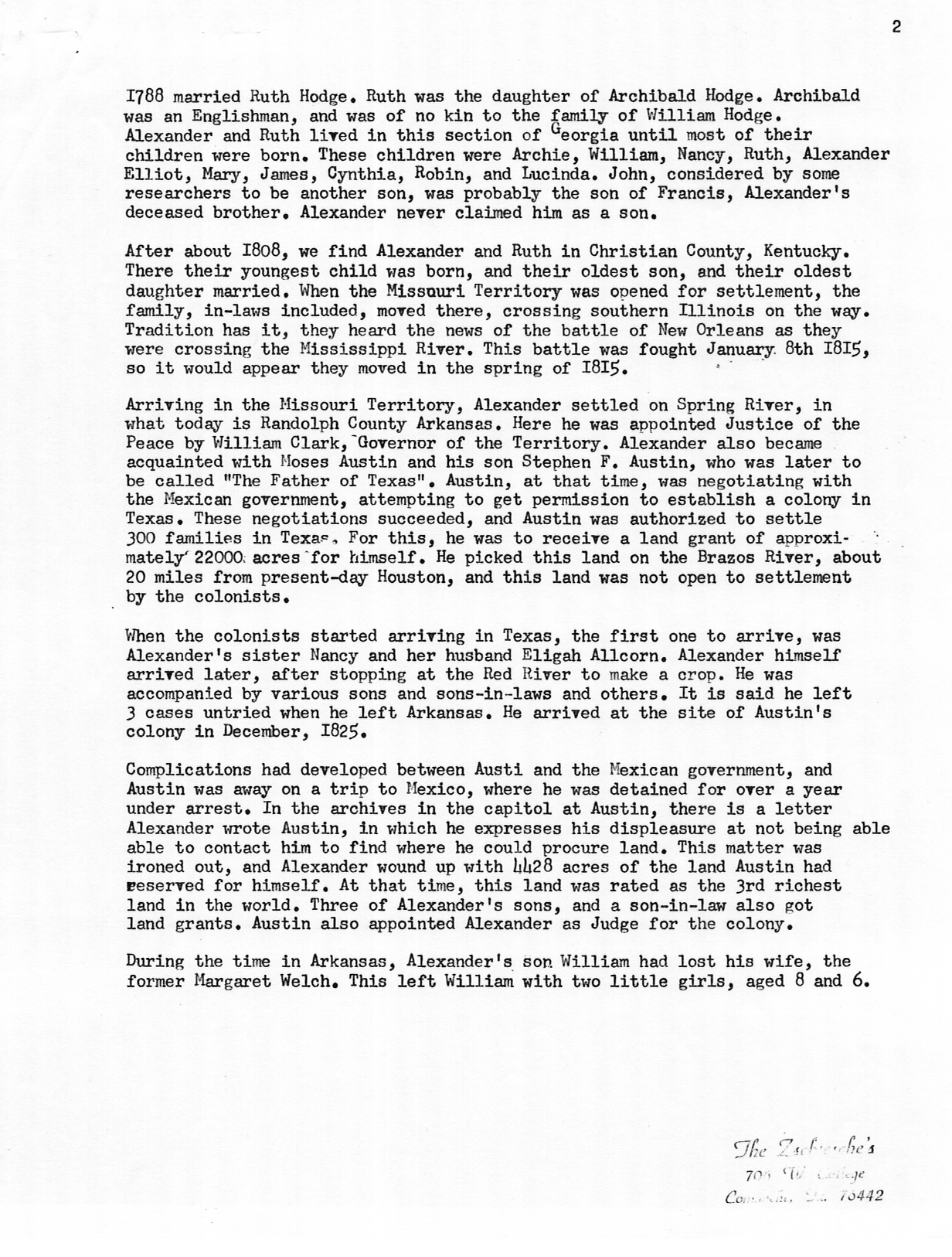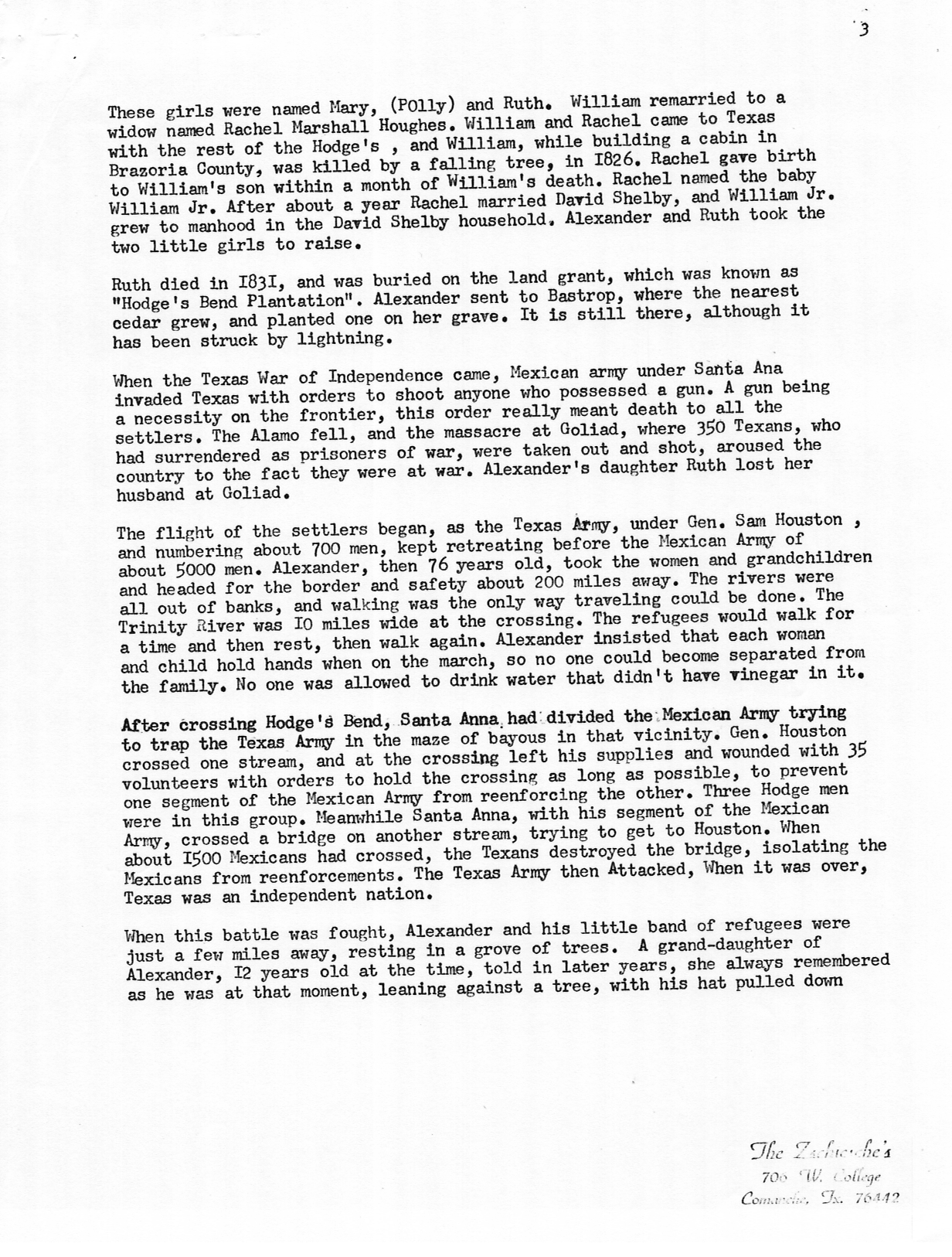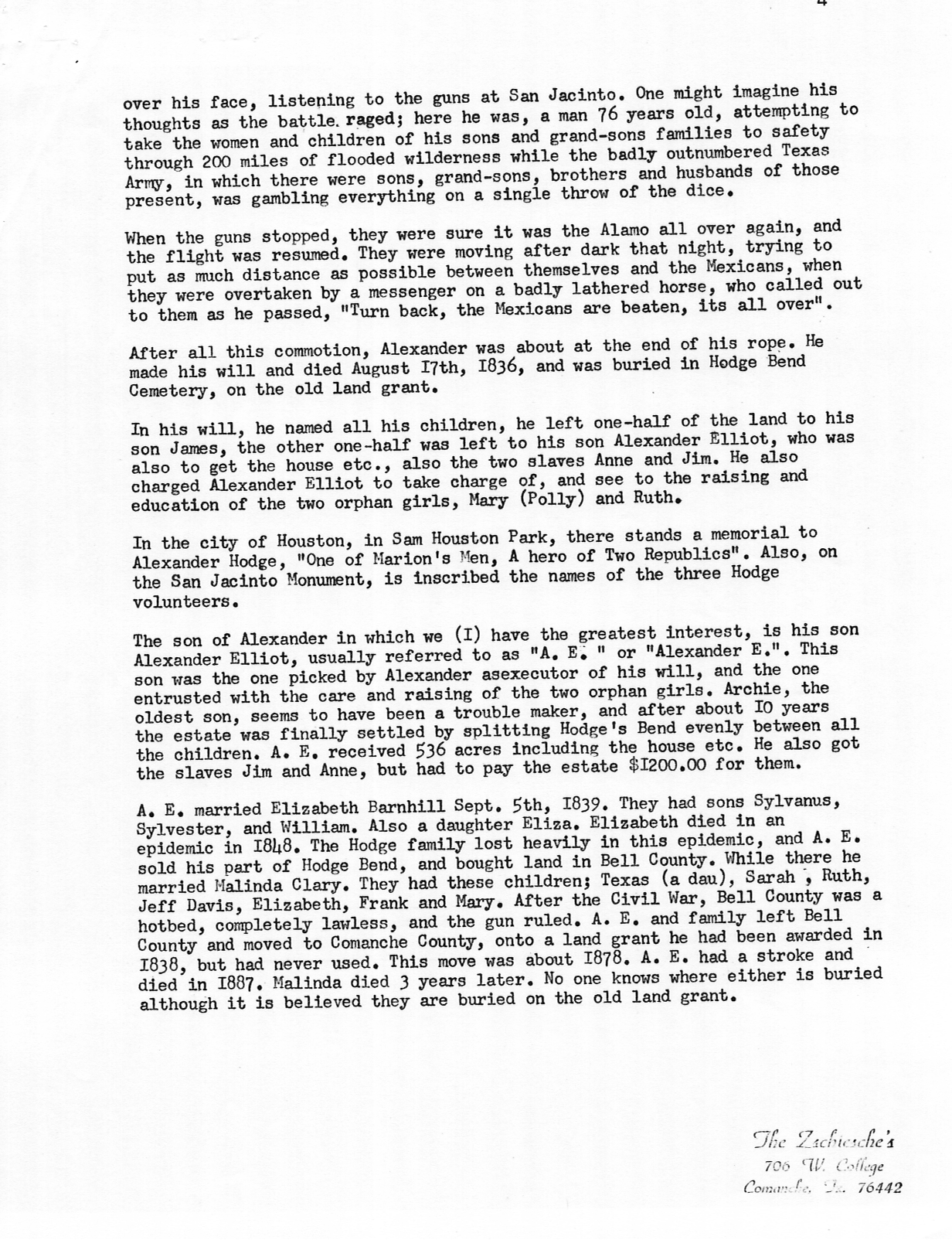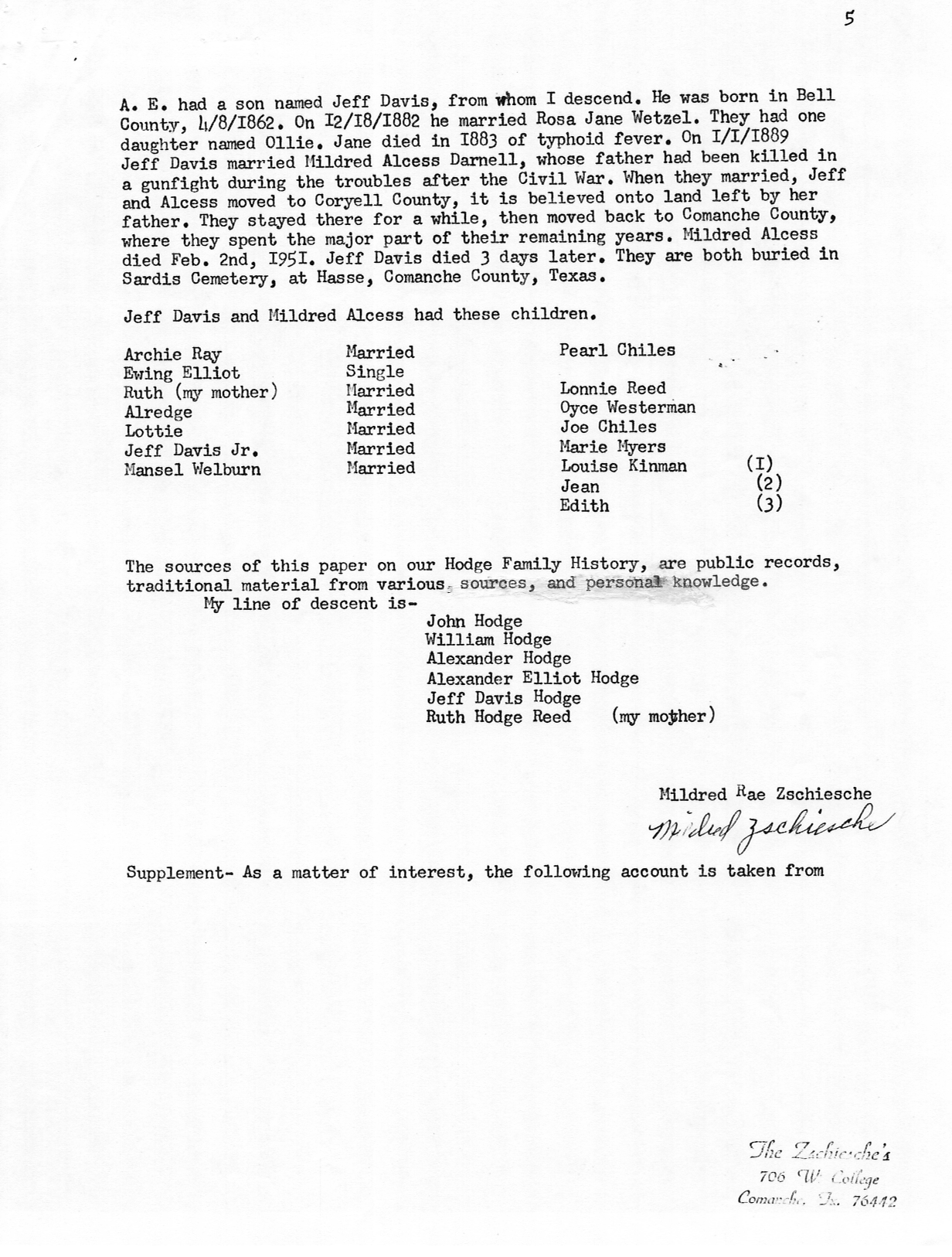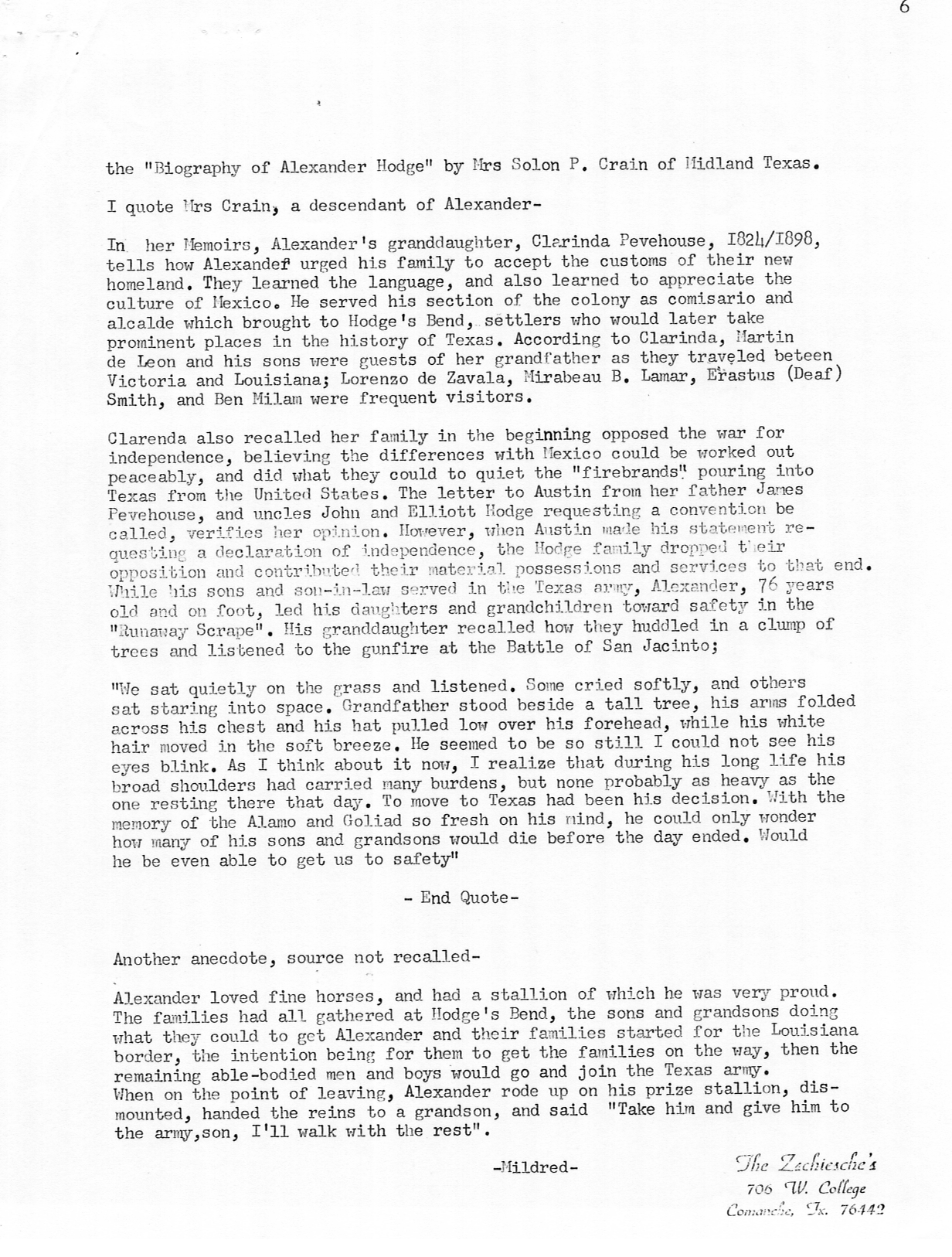Notes On Our Hodge Family History by Mildred Zschiesche
(C. Avis Catalog entry #433)
(Document ID #619)
A synopsis of our Hodge history by Mildred Zschiesche, a descendant.
1982
Little is known as to when, or from where, the progenitor of our Hodge family came to America. It is believed the family is of Scotch-Irish stock, with perhaps a bit of Welsh intermixed.
The first Hodge of which we hare record, was John Hodge, of Cumberland County, Pennsylvania. Here he was a member of the Big Spring Presbyterian Church, where he was buried at his death in 1789. He was born in 1708, but where, is unknown. In his will, he left one/half of his estate to his wife Agnes. The other one/half was to be divided equally between his son William, and his grand-son John, the son of William. We do not know who Agnes was, or if she was the mother of William. It appears likely she was the second wife of John, and not the mother of William. Trace of other children have not been found.
We do not know the exact birth date of William, the son of John, but it was probably about 1735. We are not sure of the name of his wife, although tradition says her name was Mary Elliot, and it is very likely true, however, no proof is available. William Hodge had these sons; John, Alexander, Francis, William, Elliot, and James. His daughters were: Mary, who married a Boyd, Elizabeth, who married a Murdock, Nancy, who married Elijah Allcorn, and Cynthia, who married William Barnhill.
We find traces of William in Cumberland County until about 1786, when he disappears from the records there. We then find him appearing in what is today Oglethorpe County Georgia, where he and some of his sons bought land. He and his children lived there until his death in 1794.
In his will, William names all his children except Francis, who appears to have died in the late 1780's. After listing the children and their bequests, he stipulates that his sons William and Elliot were to receive the estate where he was then residing, they to see to the care and education of the youngest son James, and when he became of age, they were to buy him 200 acres of suitable land, which they were to convey to him free of all encumbrances.
Our primary in the children of William Hodge, is his second son Alexander. Alexander was born in 1760, and is of record as of having fought in the Revolutionary War as a member of the brigade of Francis Marion, who was known as the "Swamp Fox". Alexander seemed to have been in the Carolina/Georgia section long before William moved there. At any rate, soon after William moved to Georgia, Alexander bought land on Fork Creek, and in 1788 married Ruth Hodge. Ruth was the daughter of Archibald Hodge. Archibald was an Englishman, and was of no kin to the family of William Hodge. Alexander and Ruth lived in this section of Georgia until most of their children were born. These children were Archie, William, Nancy, Ruth, Alexander Elliot, Mary, James, Cynthia, Robin, and Lucinda. John, considered by some researchers to be another son, was probably the son of Francis, Alexander's deceased brother. Alexander never claimed him as a son.
After about 1808, we find Alexander and Ruth in Christian County, Kentucky. There their youngest child was born, and their oldest son, and their oldest daughter married. When the Missouri Territory was opened for settlement, the family, in-laws included, moved there, crossing southern Illinois on the way. Tradition has it, they heard the news of the battle of New Orleans as they were crossing the Mississippi River. This battle was fought January 8th 1815, so it would appear they moved in the spring of 1815.
Arriving in the Missouri Territory, Alexander settled on Spring River, in what today is Randolph County Arkansas. Here he was appointed Justice of the Peace by William Clark, Governor of the Territory. Alexander also became acquainted with Moses Austin and his son Stephen F. Austin, who was later to be called "The Father of Texas". Austin, at that time, was negotiating with the Mexican government, attempting to get permission to establish a colony in Texas. These negotiations succeeded, and Austin was authorized to settle 300 families in Texas. For this, he was to receive a land grant of approximately 22000 acres for himself. He picked this land on the Brazos River, about 20 miles from present-day Houston, and this land was not open to settlement by the colonists.
When the colonists started arriving in Texas, the first one to arrive, was Alexander's sister Nancy and her husband Elijah Allcorn. Alexander himself arrived later, after stopping at the Red River to make a crop. He was accompanied by various sons and sons-in-laws and others. It is said he left 3 cases untried when he left Arkansas. He arrived at the site of Austin's colony in December, 1825.
Complications had developed between Austin and the Mexican government, and Austin was away on a trip to Mexico, where he was detained for over a year under arrest. In the archives in the capitol at Austin, there is a letter Alexander wrote Austin, in which he expresses his displeasure at not being able able to contact him to find where he could procure land. This matter was ironed out, and Alexander wound up with 4528 acres of the land Austin had reserved for himself. At that time, this land was rated as the 3rd richest land in the world. Three of Alexander's sons, and a son-in-law also got land grants. Austin also appointed Alexander as Judge for the colony.
During the time in Arkansas, Alexander's son William had lost his wife, the former Margaret Welch. This left William with two little girls, aged 8 and 6.
These girls were named Mary (Polly) and Ruth. William remarried to a widow named Rachel Marshall Houghes. William and Rachel came to Texas with the rest of the Hodge's, and William, while building a cabin in Brazoria County, was killed by a falling tree, in 1826. Rachel gave birth to William's son within a month of William's death. Rachel named the baby William Jr. After about a year Rachel married David Shelby, and William Jr. grew to manhood in the David Shelby household, Alexander and Ruth took the two little girls to raise.
Ruth died in 1831, and was buried on the land grant, which was known as "Hodge's Bend Plantation". Alexander sent to Bastrop, where the nearest cedar grew, and planted one on her grave. It is still there, although it has been struck by lightning.
When the Texas War of Independence came, Mexican army under Santa Ana invaded Texas with orders to shoot anyone who possessed a gun. A gun being a necessity on the frontier, this order really meant death to all the settlers. The Alamo fell, and the massacre at Goliad, where 350 Texans, who had surrendered as prisoners of war, were taken out and shot, aroused the country to the fact they were at war. Alexander's daughter Ruth lost her husband at Goliad.
The flight of the settlers began, as the Texas Army, under Gen. Sam Houston, and numbering about 700 men, kept retreating before the Mexican Army of about 5000 men. Alexander, then 76 years old, took the women and grandchildren and headed for the border and safety about 200 miles away. The rivers were all out of banks, and walking was the only way traveling could be done. The Trinity River was 10 miles wide at the crossing. The refugees would walk for a time and then rest, then walk again. Alexander insisted that each woman and child hold hands when on the march, so no one could become separated from the family. No one was allowed to drink water that didn't have vinegar in it.
After crossing Hodge's Bend, Santa Anna had divided the Mexican Army trying to trap the Texas Army in the maze of bayous in that vicinity. Gen. Houston crossed one stream, and at the crossing left his supplies and wounded with 35 volunteers with orders to hold the crossing as long as possible, to prevent one segment of the Mexican Army from reinforcing the other. Three Hodge men were in this group. Meanwhile, Santa Anna, with his segment of the Mexican Army, crossed a bridge on another stream, trying to get to Houston. When about 1500 Mexicans had crossed, the Texans destroyed the bridge, isolating the Mexicans from reinforcements. The Texas Army then Attacked, When it was over, Texas was an independent nation.
When this battle was fought, Alexander and his little band of refugees were just a few miles away, resting in a grove of trees. A grand-daughter of Alexander, 12 years old at the time, told in later years, she always remembered as he was at that moment, leaning against a tree, with his hat pulled down over his face, listening to the guns at San Jacinto. One might imagine his thoughts as the battle raged; here he was, a man 76 years old, attempting to take the women and children of his sons and grand-sons families to safety through 200 miles of flooded wilderness while the badly outnumbered Texas Army, in which there were sons, grand-sons, brothers and husbands of those present, was gambling everything on a single throw of the dice.
When the guns stopped, they were sure it was the Alamo all over again, and the flight was resumed. They were moving after dark that night, trying to put as much distance as possible between themselves and the Mexicans, when they were overtaken by a messenger on a badly lathered horse, who called out to them as he passed, "Turn back, the Mexicans are beaten, its all over".
After all this commotion, Alexander was about at the end of his rope. He made his will and died August 17th, 1836, and was buried in Hodge Bend Cemetery, on the old land grant.
In his will, he named all his children, he left one-half of the land to his son James, the other one-half was left to his son Alexander Elliot, who was also to get the house etc., also the two slaves Anne and Jim. He also charged Alexander Elliot to take charge of, and see to the raising and education of the two orphan girls, Mary (Polly) and Ruth.
In the city of Houston, in Sam Houston Park, there stands a memorial to Alexander Hodge, "One of Marion's Men, A hero of Two Republics". Also, on the San Jacinto Monument, is inscribed the names of the three Hodge volunteers.
The son of Alexander in which we (I) have the greatest interest, is his son Alexander Elliot, usually referred to as "A. E. " or "Alexander E.". This son was the one picked by Alexander as executor of his will, and the one entrusted with the care and raising of the two orphan girls. Archie, the oldest son, seems to have been a trouble maker, and after about 10 years the estate was finally settled by splitting Hodge's Bend evenly between all the children. A. E. received 536 acres including the house etc. He also got the slaves Jim and Anne, but had to pay the estate $1200.00 for them.
A. E. married Elizabeth Barnhill Sept. 5th, 1839. They had sons Sylvanus, Sylvester, and William. Also a daughter Eliza. Elizabeth died in an epidemic in 1848. The Hodge family lost heavily in this epidemic, and A. E. sold his part of Hodge Bend, and bought land in Bell County. While there he married Malinda Clary. They had these children; Texas (a dau.), Sarah, Ruth, Jeff Davis, Elizabeth, Frank and Mary. After the Civil War, Bell County was a hotbed, completely lawless, and the gun ruled. A. E. and family left Bell County and moved to Comanche County, onto a land grant he had been awarded in 1838, but had never used. This move was about 1878. A. E. had a stroke and died in 1887. Malinda died 3 years later. No one knows where either is buried although it is believed they are buried on the old land grant.
A. E. had a son named Jeff Davis, from whom I descend. He was born in Bell County, 4/8/1862. On 12/18/1882 he married Rosa Jane Wetzel. They had one daughter named Ollie. Jane died in 1883 of typhoid fever. On 1/11889 Jeff Davis married Mildred Alcess Darnell, whose father had been killed in a gunfight during the troubles after the Civil War. When they married, Jeff and Alcess moved to Coryell County. It is believed onto land left by her father. They stayed there for a while, then moved back to Comanche County where they spent the major part of their remaining years. Mildred Alcess died Feb. 2nd, 1951. Jeff Davis died 3 days later. They are both buried in Sardis Cemetery, at Hasse, Comanche County, Texas.
Jeff Davis and Mildred Alcess had these children.
Archie Ray married Pearl Chiles
Ewing Elliot - Single
Ruth (my mother) married Lonnie Reed
Alredge married Oyce Westerman
Lottie married Joe Chiles
Jeff Davis Jr, married Marie Myers
Mansel Welburn married (1) Louise Kinman (2) Jean (3) Edith
The sources of this paper on our Hodge Family History, are public records, traditional material from various sources, and personal knowledge.
My line of descent is -
John Hodge
William Hodge
Alexander Hodge
Alexander Elliot Hodge
Jeff Davis Hodge
Ruth Hodge Reed (my mother)
Mildred Rae Zschiesche
Supplement- As a matter of interest, the following account is taken from the "Biography of Alexander Hodge" by Mrs. Solon P. Crain of Midland Texas.
I quote Mrs. Crain, a descendant of Alexander-
In her Memoirs, Alexander's granddaughter, Clarinda Pevehouse, 1824/1898, tells how Alexander urged his family to accept the customs of their new homeland. They learned the language, and also learned to appreciate the culture of Mexico. He served his section of the colony as comisario and alcalde which brought to Hodge's Bend, settlers who would later take prominent places in the history of Texas. According to Clarinda, Martin de Leon and his sons were guests of her grandfather as they traveled between Victoria and Louisiana; Lorenzo de Zavala, Mirabeau B. Lamar, Erastus (Deaf) Smith, and Ben Milam were frequent visitors.
Clarinda also recalled her family in the beginning opposed the war for independence, believing the differences with Mexico could be worked out peaceably, and did what they could to quiet the "fire brands" pouring into Texas from the United States. The letter to Austin from her father James Pevehouse, and uncles John and Elliott Hodge requesting, a convention be called, verifies her opinion. However, when Austin made his statement requesting a declaration of independence, the Hodge family dropped their opposition and contributed their material possessions and services to that end. While his sons and son-in-law served in the Texas army, Alexander, 76 years old and on foot, led his daughters and grandchildren toward safety in the "Runaway Scrape". His granddaughter recalled how they huddled in a clump of trees and listened to the gunfire at the Battle of San Jacinto;
"We sat quietly on the grass and listened. Some cried softly, and others sat staring into space. Grandfather stood beside a tall tree, his arms folded across his chest and his hat pulled low over his forehead, while his white hair moved in the soft breeze. He seemed to be so still I could not see his eyes blink. As I think about it now, I realize that during his long life his broad shoulders had carried many burdens, but none probably as heavy as the one resting there that day. To move to Texas had been his decision. With the memory of the Alamo and Goliad so fresh on his mind, he could only wonder how many of his sons and grandsons would die before the day ended. Would he be even able to get us to safety."
- End Quote -
Another anecdote, source not recalled -
Alexander loved fine horses, and had a stallion of which he was very proud. The families had all gathered at Hodge's Bend, the sons and grandsons doing what they could to get Alexander and their families started for the Louisiana border, the intention being for them to get the families on the way, then the remaining able-bodied men and boys would go and join the Texas army. When on the point of leaving, Alexander rode up on his prize stallion, dismounted, handed the reins to a grandson, and said "Take him and give him to the army, son, I'll walk with the rest".
Mildred

